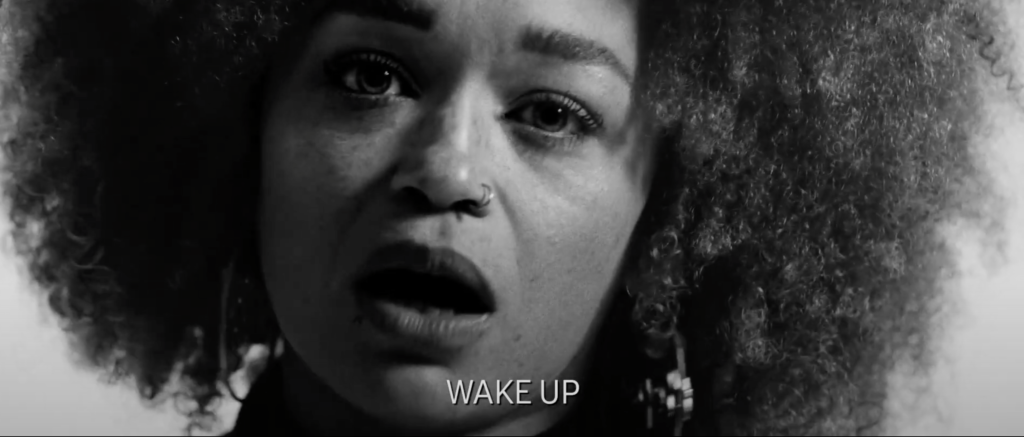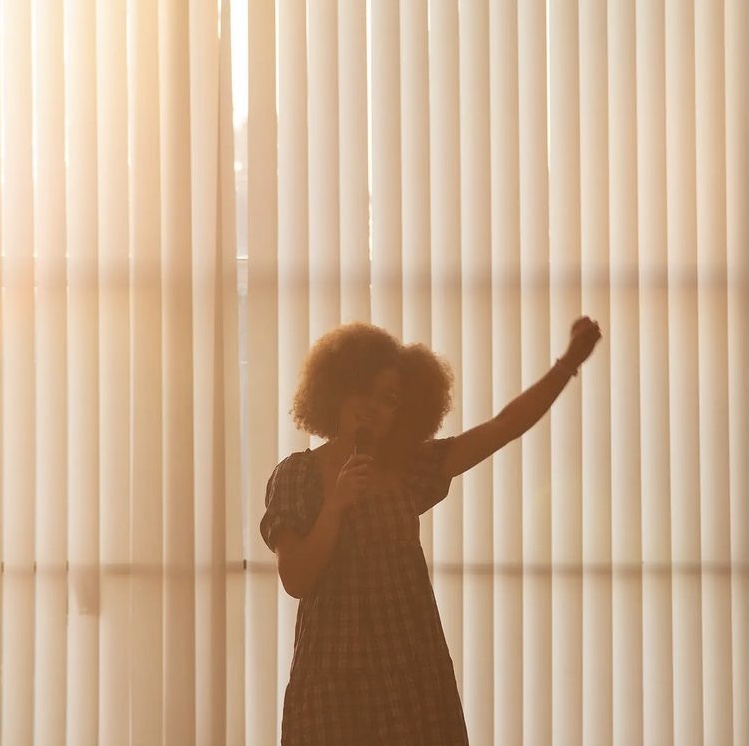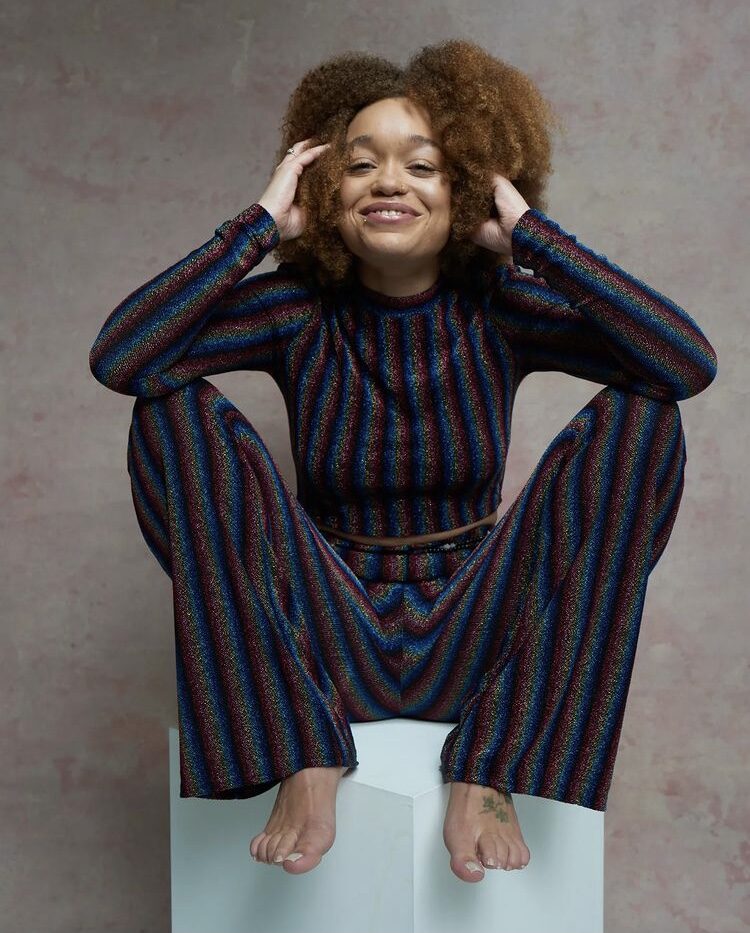Words by Éloïse Armary
AFLO. the poet is a spoken word artist. She started performing in 2019 and now is a strong knot in the black poetry scene in Brighton. I had the occasion to see her live several times – she is a storm of energy who takes the whole room’s breath with her flow. Let’s introduce you to her creative input that I hope, will inspire you this year to make your own art to express matters close to your heart.
Tell me how you got into poetry.
After uni, I worked in a therapeutic community, working with people with psychosis and addictions. The need to help people was incongruent with the need to help myself. In the job, everything crumbled apart. I couldn’t work, I was in bed, catatonic for a year. It was a burnout and years of not wanting to look inside. I always wanted to look outwards, how I can help to make things better for other people, that must make me feel better, rather than looking inwards first before I could turn myself outwards. I spent a lot of time in therapy, I started working in a college with young people with autism and worked my way up there.
It was there that I started to do poetry. I went to The Fringe one year, in 2018, to see Travis Alabanza. There were local poets performing, Subira was one of them. That was one of the first times that I heard of spoken word and thought that was something that I could do, as a way of expressing myself. Although poetry can feel dull, I saw people that I could relate to; a lot of the poems were about race and gender identity. It really clicked for me.
I started performing in March 2019 for International Women’s Day, it was at Dead Wax, there were female performers and artists from around the city. I wrote about being a woman of colour with mental health difficulties, it’s quite a big thing to try and break down! It was my first poem. My poetry has always been about an expression because I haven’t felt able to be heard by adults. I started doing poetry at twenty-seven, which is as many years as possible of not feeling heard.
After I shared this poem, people tell me about how it resonated with them, how they saw a part of themselves in a part of it. It circles back with my want to help people, but not being able to help them because I need to help myself. I feel poetry has been the missing link in that, it has been a good reflecting tool for me.
How important did poetry become to you in your life?
It initially felt like a really cool thing to do, going to open mics and share what I had to say. But there wouldn’t be any other black artist there. I remember going to another poetry night, where Priss Nash was performing, that was the first time I heard her poetry. We were doing similar things, but we weren’t coming together. One day I went to a gig with other black poets, and I said: we need to change the scene! It was the last gig before Covid hit. Then George Floyd was murdered, we came together in the community, different people wrote different things for protests. Priss and I wrote Wake Up together. This year, I am working with QM records to put together nights of AFLO. and the poets with a line-up of black and marginalised gender poets. After the pandemic, I’m trying to hold more spaces, share more poetry, encourage more people to have a go, holding more workshops.

Talk to me more about Wake Up.
Wake Up came about because Sam Parish-Rookes approached Brighton Black Lives Matter and offer up his skills as a white ally for the movement and make a video of some kind. He approached me separately because I had written a different poem about George Floyd not long before. He wanted me to do a voice-over for the film about the protest. Priss and I were talking about writing a poem together, we had been grieving together and protesting together already. We thought this would be a good thing to do healing wise. Sam suggested the idea of wake up: what’s it like to wake up on the day of a protest, what’s it like to see people waking up at a protest to the things you have been talking about your whole life, what’s it like to wake up after the protest. At first, we weren’t sure about it, but it actually felt like a really good framework. We started about what it is like to wake up in the body you’re existing it, that is experiencing racism. What it feels like waking up during the protest and after the protest, we already predicted what it feels like waking up to people falling off that bandwagon. It was clearly a trend. Priss and I wrote it in two evenings together, it flows out, it felt quite cathartic.
It went from there, it’s really amazing where it’s taken us. It’s been shared around the world, by some Black famous people. There is a local brewery that has a craft beer BN1, they wanted to put some local Brightonians on it, they put us on that beer can. It’s really strange how I write a poem, I perform it at a protest, and now I’m on a beer can. That’s not something that I expected or predicted out of it, but that’s a really lovely thing to embrace.
After Wake Up and the protest, Latest TV approached me and wanted to do a little TV series on anything that I wanted. I wanted to platform other black artists, I brought on other spoken word artists or musicians, featuring other arts in the background. From that, Brighton Dome put on events to raise money for live venues. They asked AFLO. and the poets to perform at the Dome, which was very different from the interviews for the TV Show. Priss, Khanyisa and I performed at the Dome, and we wrote a song together about Black joy. We did that again for a whole night at the Green Door Store, and again at the Unitarian Church.
After that, I performed again at Brighton Dome; the New Civilisation Orchestra is doing a tour around the country to commemorate Martin Gaye. In each city, they perform with a spoken word artist to talk about ‘what’s going on’ politically in their eyes and in their city. It’s really sad, fifty years on, that all the lyrics in his songs feel relevant, in terms of seeking racial equity and justice; and police brutality.
Do you think performing live creates a community?
Yes, even more so after a year and a half of not being able to be together. When we did AFLO. and the poets at Green Door Store, there were so many black people in the crowd, I hadn’t seen a night like that in Brighton in my life. And that’s what we wanted! We were able to bring that back after not only events were in danger, but people’s lives were in danger. Here we are we’ve come back bigger than ever and better. It’s a good distraction from the world being on fire! It feels that what we have been able to do locally has been really beautiful.

Credit: Andreas Lange
Tell me about an artist who inspires you.
Bob Marley. He’s my grandma’s first cousin. There are pictures of him around everyone’s family house. I remember not being older than six, and crying, because I wanted to be like Bob Marley, or as Martin Luther King, and trying to get black liberation. That felt so important because that was everything that was drummed into me from before school. I thought that racism was over because I’m mixed race, my mum is white, my dad is black. I cried because I thought I couldn’t be like them. It’s sad that the fight is still ongoing. But I’m really proud of myself and I think little me would be really proud of myself, because I’m doing what I wanted to do, and even if I thought I couldn’t do it for whatever reason, that’s how life turned out.
AFLO. the poet has gigs and workshops coming up this year, be sure to follow her on her Instagram to see her live! You can also find the series AFLO. and the poets on Youtube as well the film Wake Up.
Youtube: AFLO. the poet
Instagram: @aflo.thepoet

